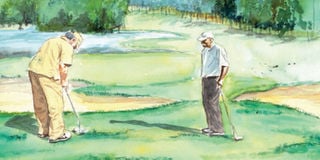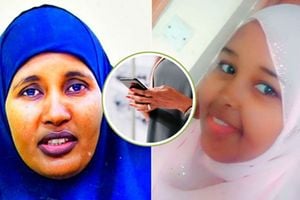Even in the age of DNA, maternity is a fact and paternity only a presumption

I strolled on the course to get a feel of an English golf course. It was a warm sunny day and there were a lot of golfers with no caddies. ILLUSTRATION| JOHN NYAGAH
What you need to know:
- Conversely, avoid the British winter accompanied by snow, hail and rain with below-zero temperatures and enjoy the hot sun that prevails in Kenya while Britain is in the throes of winter.
- The plan was also devised to give us more time with our daughter and son who have settled in or near London.
- They went to England for their university education, because the courses they wanted to do, computer science in the case of our daughter and marketing and management for our son, were not available in Kenya then.
I had time to study the British society and it was nice to note that it has changed from strictly ‘Mind your own business’ to ‘Can I help’
Last year Marie and I stayed in England continuously for three months in June, July and August, something I had not done since my stay there from 1955 to 1961, when I went there to train as a surgeon. It was part of a plan made when I retired from surgery, the idea being to enjoy the best of both worlds.
It meant passing the British summer in Britain and avoiding the harshness of winter in Nairobi because old bones do not take kindly to freezing temperatures.
Conversely, avoid the British winter accompanied by snow, hail and rain with below-zero temperatures and enjoy the hot sun that prevails in Kenya while Britain is in the throes of winter.
The plan was also devised to give us more time with our daughter and son who have settled in or near London. They went to England for their university education, because the courses they wanted to do, computer science in the case of our daughter and marketing and management for our son, were not available in Kenya then.
They found their spouses, careers and naturally settled there. Our need to pass more time with them arose mainly because out of my four wives — surgery, Rotary, writing and family — the first one proved very demanding and the last one enjoyed no priority at all.
So when I retired from consulting, operating and teaching surgery, I made a pledge that I would make up for lost time and restore the balance. Of course, this arrangement and the theory of enjoying the best of both worlds is viable only until we can take long flights. Eventually we would be faced with making the hard decision to settle in one. That eventuality is imminent soon.
Since we were in Britain for an unusually long time, I had time to study the British society and it was nice to note that it has changed from strictly ‘Mind your own business’ to ‘Can I help?’. It is also largely a non-racial society, where other ethnic minorities hold senior positions in all spheres of life, more apparent in television and health services from GP to the highest academic level. The other thing we did was to renew our contact with old friends, mainly the friendship established in Kenya.
One of them was Toni, wife of a diplomat who had served in Nairobi. His posting after Nairobi was in the Gulf, where he suddenly died of a massive ‘coronary’.
We invited Toni for lunch and took her to the ‘pub’ within walking distance from our pad by River Thames, where she ordered a beef-burger. “This is scrumptious,” she said as she took a big bite off the bun. “As delicious as the minute steak I had at the Muthaiga Club when you invited me there for a meal.”
“I even remember what you said when you came the first time.” I replied. “You said that the Club was high-class because even the water served had mint and a piece of lemon in it.”
When she was leaving after a long drawn-out lunch, she asked me, “Do you still play golf?”
“No more, I am afraid.” I explained. “Age-related arthritis in both knees put an end to it. That was my only physical and outdoor hobby. I also enjoyed listening to the chirping birds, the fragrance of the moist soil and the flowers, the solitude one obtains in the early morning and the pleasure of my own company because often I played alone.” Carried away by my own enthusiasm, I added. “In fact many ‘Surgeon’s Diary’ stories were articulated in my mind on the golf course. As the arthritis progressed, I demoted myself from 18 holes to nine and finally to the loop before I had to give up altogether. I miss it very much.”
“I am asking because I play golf at my Club, near my house. Never mind, if you don’t play now, perhaps you could all join me for lunch one of these days.” she suggested.
We fixed a mutually convenient day and parted as she said, “See you at around midday next Thursday.”
As we walked back to our apartment, after seeing her off, Marie reminded me how she met Toni.
“We met at the Nairobi airport when our flight to Mombasa was delayed by a full twelve hours. Since we both had children who were getting fidgety, we started talking. In conversation, we found that we were staying at the same hotel, which meant that the children, her three sons and our two, could play together and we didn’t have to worry about them.”
“Where was I?” I asked.
“As usual, you couldn’t join us for children’s Easter break because you were busy at the hospital,” Marie replied, her bitterness obvious.
“And where was Toni’s husband?” I inquired.
“He too was busy at the embassy.” Marie replied, realising why I had asked that question.
We both visited Toni at her golf club with Jenny and Jan. She had invited her son working and living in Guildford, not very far from where we were. “Adam works with the British Army in Mogadishu and goes to Nairobi quite often.” Toni said to update us on her eldest son.
I strolled on the course to get a feel of an English golf course. It was a warm sunny day and there were a lot of golfers with no caddies. It was August and the fairways were covered with shiny grass and the greens were beautifully manicured. When I came back, I found that Toni had found a table outside and as I joined them, I saw a couple who proved to be Kenyan sitting next to our table. Initially they just acknowledged me. After we ordered our drinks and food, Marie whispered to me. “That man has not taken his eyes off you.”
“Didn’t you know that you married a very famous man?” I humoured her.
True enough, in a few minutes the man passed by our table on the way to the washroom and tentatively said “Jambo.” I reciprocated the greeting warmly and as a result on the way back he was emboldened to ask me. “Are you the surgeon from Kenya?”
“Guilty as charged,” I replied in a light vein.
“You might not remember me,” he said. “But you have operated on me.”
Just as well I refrained from using my usual response with which I react when a lady on whose breast I have operated upon. It is, ‘If I had seen the scar first, I would have recognised you.’ Instead, I solemnly asked. “What was it for?”
“For undescended testes on both sides.” Looking at my inquiring face, he elaborated. “My wife’s gynaecologist referred me to you when we saw her for infertility.”
“Did she organise a semen analysis on you?” I asked as I remembered the lady gynaecologist who regularly sent me the husband to rule out him being responsible for the couple’s inability to have children.
“No,” he replied. “She just examined me and finding my bilateral undescended testes, she felt sure that I was the faulty party. But after examining me, you sent me for the test and it proved that I had no sperms. I still remember what you told me before surgery.” He continued, “You told my wife and me that it was unlikely that orchidopexy might prove a success fertility-wise because of late surgery but it was indicated from a cosmetic point of view and testis in the scrotum is less likely to develop malignancy as when it is left in the groin where mine were.”
“Did we do a semen analysis after surgery?” I asked.
“I can’t remember but I do remember you saying that the proof of the pudding is in the eating,” he explained.
“What was the taste of the pudding?” I asked using his figure of speech, realising that he was not answering my crucial inquiry.
“Very sweet,” he replied with glee. “We have one daughter and one son. Since that completed our family, my wife asked her gynaecologist to insert a coil.”
When we returned home in Nairobi, I looked up the man’s file in my library, where I stored all my patients’ files when I retired from surgery and closed my office in the hospital.
My hunch was proved right when I found and perused his file. The post-operative semen analysis simply said ‘Azoospermia’, surgical jargon for no sperms! I sat in the library thinking that miracles do occur in surgery and this could be one.
But then I remembered reading medical statistics which stated that at least one child in ten is not sired by the person widely perceived to be the biological father. Finally, I recounted what my professor had said to us in my undergraduate days over half a century ago.
He said, “Maternity is a matter of fact but paternity is only a matter of presumption!” How true before we knew about DNA! Still true because people do not go for DNA tests except in cases of disputed paternity. I thought also the Kenyan wife was very clever to have got the coil inserted right under her husband’s watch!





